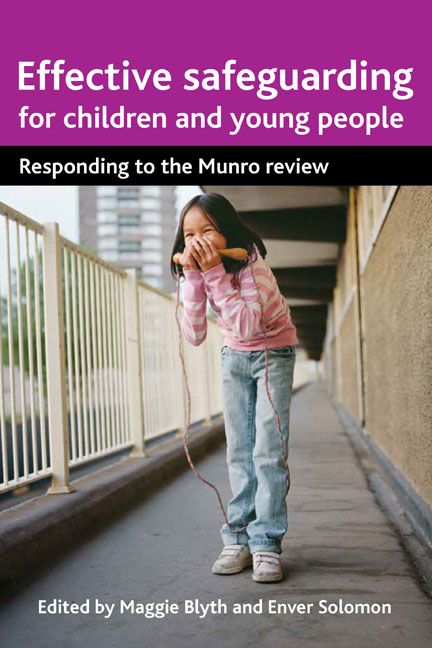Book contents
- Frontmatter
- Contents
- List of abbreviations
- Notes on contributors
- Acknowledgements
- Foreword
- one Early intervention
- two Local safeguarding children boards: faith, hope and evidence
- three The child's voice in the child protection system
- four Parental mental health, risk and child protection: what does Munro mean to child protection and adult mental health?
- five Adolescent-to-parent abuse and frontline service responses: does Munro matter?
- six Older children and the child protection system
- seven Serious case review
- Index
five - Adolescent-to-parent abuse and frontline service responses: does Munro matter?
Published online by Cambridge University Press: 07 September 2022
- Frontmatter
- Contents
- List of abbreviations
- Notes on contributors
- Acknowledgements
- Foreword
- one Early intervention
- two Local safeguarding children boards: faith, hope and evidence
- three The child's voice in the child protection system
- four Parental mental health, risk and child protection: what does Munro mean to child protection and adult mental health?
- five Adolescent-to-parent abuse and frontline service responses: does Munro matter?
- six Older children and the child protection system
- seven Serious case review
- Index
Summary
He’d just come in and he’d lost his temper with some kids outside, come in and just took it out on the house. Well, he actually picked me up and threw me across his bedroom as well and he's only 14 … and all they said to me was … the youth panel man turned round to the magistrates and said ‘I think Mrs Smith should have a parenting order’ and they just agreed straight away. But to me I was disgusted because it's me that got David arrested, hoping that he’d calm down, for when he gets older, sort of thing … I don't want him growing up and ending up in prison.
(Lone mother of three, England)Parent abuse is a hidden yet prevalent problem which presents a number of challenges to practitioners who work on the frontline in the fields of social care, criminal justice, education and health. Current practice struggles to meet these challenges and, as a consequence, families continue to be at risk. With the recent publication of the Munro Review (Munro, 2011), this chapter explores the extent to which it might enable better service responses for such vulnerable families. The chapter begins by outlining the defining characteristics of adolescent-to-parent abuse and explores why it presents distinct challenges to frontline practitioners who may nevertheless have considerable experience of working with other forms of family violence. In particular, this chapter discusses the tools that are currently available to practitioners who work in policing, youth justice, social care, education and health when faced with cases of parent abuse, and why such tools are inappropriate as a response. The chapter concludes by assessing how the key themes for change underpinning Munro's recommendations might enable the development of more appropriate statutory responses to parent abuse and highlights areas which require more fundamental consideration.
Adolescent-to-parent abuse: a challenge to frontline services
Parent abuse has not yet achieved the status of ‘social problem’ which other forms of family abuse have, such as child abuse, intimate partner violence (IPV) and elder abuse. Nevertheless, it shares a number of important features. It is characterised by a persistent pattern of behaviour which uses physical, emotional or economic means to practise power and exert control over a parent, and it may involve shouting and screaming, blackmail, threats, demands and insults, and/or physical violence.
- Type
- Chapter
- Information
- Effective Safeguarding for Children and Young PeopleWhat Next after Munro?, pp. 91 - 106Publisher: Bristol University PressPrint publication year: 2012



